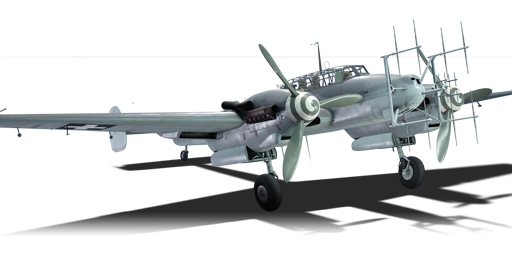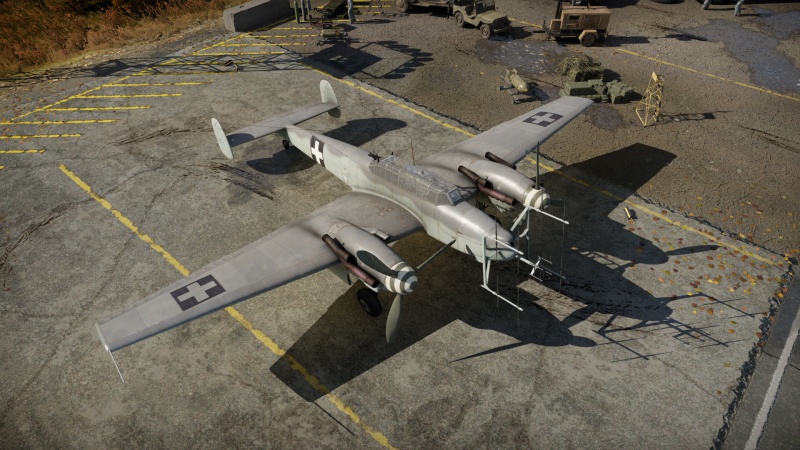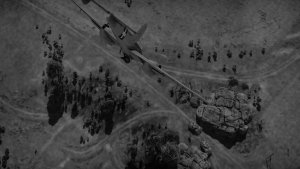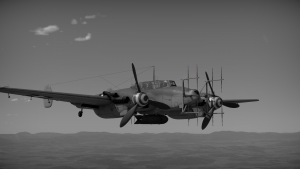Bf 110 G-4 (Italy)
| This page is about the strike aircraft Bf 110 G-4 (Italy). For other versions, see Bf 110 (Family). |
Contents
Description
The ◐Bf 110 G-4 is a premium rank III Italian strike aircraft with a battle rating of 3.7 (AB/RB/SB). It was introduced in Update "Raining Fire".
The Bf 110 G-4 is a multi-role aircraft, but is mainly used as an interceptor thanks to its radar and its armament perfect for shooting down enemy aircraft but also another role that is the CAS, in fact the Bf 110 G-4 can carry a wide variety of weapons that can be used against land and naval targets such as the 1000 kg bomb SC1000L2, or can use four rockets Wfr.Gr.21
General info
The Bf 110 G-4 it's a fighter-interceptor and a CAS plane, with its payload it can destroy different enemies like heavy tanks, light vehicles but also big ships, and it is very good against enemy bombers.
Flight performance
| Characteristics | Max Speed (km/h at 6,200 m) |
Max altitude (metres) |
Turn time (seconds) |
Rate of climb (metres/second) |
Take-off run (metres) | |||
|---|---|---|---|---|---|---|---|---|
| AB | RB | AB | RB | AB | RB | |||
| Stock | 569 | 552 | 10700 | 26.2 | 27.2 | 9.3 | 9.3 | 450 |
| Upgraded | 615 | 591 | 23.8 | 25.0 | 16.5 | 12.5 | ||
Details
| Features | ||||
|---|---|---|---|---|
| Combat flaps | Take-off flaps | Landing flaps | Air brakes | Arrestor gear |
| ✓ | ✓ | ✓ | X | X |
| Limits | ||||||
|---|---|---|---|---|---|---|
| Wings (km/h) | Gear (km/h) | Flaps (km/h) | Max Static G | |||
| Combat | Take-off | Landing | + | - | ||
| 0 | 320 | 467 | 438 | 290 | ~12 | ~5 |
| Optimal velocities (km/h) | |||
|---|---|---|---|
| Ailerons | Rudder | Elevators | Radiator |
| < 360 | < 350 | < 370 | > 715 |
Survivability and armour
The Bf 110 G-4 is a very robust and resistant aircraft, like the rest of the 110 series. It can withstand hits of up to 20 millimeters without problems, obviously depending on where it is hit, for example if it is hit the engines or tanks, let's say that it will not resist much because they are critical points of the aircraft. The level of survival is also very good, the "vital" area of the aircraft is all in the middle, tanks and crew. As we find 3 members, the pilot and the two gunners, a tail gunner and a gunner for the cannons positioned above the aircraft.- 5 mm steel underneath pilot
- 6 mm steel underneath gunner
- 6 mm steel above and below liquid cooling systems
- 6 mm steel in front of engines
- 8.5 mm steel in front of gunner (note that the gunner is rear-facing)
- 8.5 mm steel in front of radar equipment in cockpit
- 8.5 mm steel between radar antennae and nose-mounted cannon ammunition
- 10.5 mm steel beside and in front of pilot's controls
- 10.5 mm steel behind pilot's head
- 58 mm bulletproof glass in front of pilot
- Self-sealing fuel tanks (2 in each wing)
Modifications and economy
Armaments
Offensive armament
The Bf 110 G-4 (Italy) is armed with:
- 2 x 30 mm MK 108 cannons, nose-mounted (128 rpg = 255 total)
- 2 x 20 mm MG FF/M cannons, Schräge Musik-style in front of gunner (240 rpg = 480 total) The offensive armament consists of two 30 mm MK 108 and two 20 mm MG 151. The two MK 108 30 mm contains mainly in the belts HEI-T and I, these bullets cause severe damage to enemy aircraft and open ground vehicles, while the two MG 151 20 mm are very good for destroying enemies and light vehicles, I recommend the belts anti-aircraft to both armament
Suspended armament
The Bf 110 G-4 (Italy) can be outfitted with the following ordnance:
- 2 x 20 mm MG 151 cannons, belly-mounted (400 rpg left + 350 rpg right = 750 total)
- 12 x 50 kg SC50JA bombs + 2 x 20 mm MG 151 cannons (600 kg total)
- 2 x 250 kg SC250JA bombs + 2 x 20 mm MG 151 cannons (500 kg total)
- 1 x 500 kg SC500K bomb + 2 x 20 mm MG 151 cannons (500 kg total)
- 2 x 500 kg SC500K bombs + 2 x 20 mm MG 151 cannons (1,000 kg total)
- 1 x 1,000 kg SC1000L2 bomb + 2 x 20 mm MG 151 cannons (1,000 kg total)
- 1 x 1,000 kg SC1000L2 bomb + 1 x 250 kg SC250JA bomb + 2 x 20 mm MG 151 cannons (1,250 kg total)
- 4 x 20 mm MG 151 cannons
- 4 x Wfr.Gr.21 rockets + 2 x 20 mm MG 151 cannons
- 4 x Wfr.Gr.21 rockets + 4 x 20 mm MG 151 cannons
In our opinion the most convenient and effective payload for the Bf 110 G-4 is the third one, the two 20 mm cannons and the two 500 kg bombs. The two mg 151 are super effective to fight other aircrafts for example in frontal attacks or to cause serious damage to bombers. With these two additional cannons you will be able to perform an important task of air superiority, but thanks to these 20mm you will be able to do a great job as CAS. With the two 500kg bombs feel free to use them as you wish, you can use them for everything. From bombing bases, to bombing ships and tanks. But in case of need with a bit of skill you can use them to get an enemy off your tail by going low to the ground and dropping them, the 500 kg bomb is powerful enough to do critical damage to light aircraft following you.
Defensive armament
The Bf 110 G-4 (Italy) is defended by:
- 2 x 7.92 mm MG 81 machine guns, dorsal turret (750 rpg = 1,500 total) The defensive armament is positioned behind the pilot's cabin and consists of two MG 81 7.92mm machine guns with an excellent rate of fire of 1600 rounds/min and thanks to this rate of fire you can cause extensive damage to bombers and enemy aircraft that are in the rear. The best Belt to use is AP-T one with two AP-I and two AP-T.
Usage in battles
The Bf 110 G-4 is an excellent aircraft to perform almost any task, I am not saying that it can be used to fight fighters, but it can be used to defend allied bombers, or it can simply act as a support aircraft thanks to its two rear mg. It is an excellent aircraft to destroy ground targets and provide cover for allied tanks, but it can also be used as a heavy fighter and thus provide air superiority in a very effective way, if accompanied by some fighters. We recommend using it according to the needs of the team. If the squadron needs more of a CAS aircraft we recommend to use the payload discussed above and perform the task as a CAS aircraft, if the bombers need cover then do not equip external payload and take the necessary altitude to fight. It is very free as a style of play aircraft.
Radars
The Bf 110 G-4 is equipped with a FuG 220 search radar, located in the nose of the aircraft; a control box which is part of the radar damage model is located behind the pilot.
| FuG 220 - Target Detection Radar | |||
|---|---|---|---|
| Maximum Detection Range |
Guaranteed Detection Range |
Max Azimuth Scan Angle |
Max Elevation Scan Angle |
| 5,000 m | 5,000 m | ±35° | -55°/+20° |
Manual Engine Control
| MEC elements | ||||||
|---|---|---|---|---|---|---|
| Mixer | Pitch | Radiator | Supercharger | Turbocharger | ||
| Oil | Water | Type | ||||
| Not controllable | Controllable Auto control available |
Controllable Auto control available |
Controllable Auto control available |
Separate | Not controllable 1 gear |
Not controllable |
Pros and cons
Pros:
- Great variety of payload options
- Very powerful armament
- Has Schräge Musik cannons
- Can carry powerful Wfr.Gr.21 rockets
- Can carry the large SC1000L2
- Has radar
Cons:
- Not very manoeuvrable
- Rockets are hard to aim (they fire in an upwards arc meaning you will have to fire them at ground targets while shallow diving)
- Extra crew member means more weight than other Bf 110s
History
The Messerschmitt Bf 110 was developed, starting in the second half of the 1930s, to provide the Luftwaffe with a twin-engine heavy fighter capable of long-range deployment and capable of performing multi-role missions of fighter, tactical bomber and close support.
The Bf 110 entered service in 1939 and 1940 with the role of air support to German ground forces, escort fighter and strategic bomber, then around 1943 the Bf 110 continued to fight and was used as a defense aircraft and interceptor.The Bf 110 had several variants including:
- Bf 110 A
- Bf 110 B
- Bf 110 C (Bf 110 C-6, Bf 110 C-7)
- Bf 110 D
- Bf 110 E
- Bf 110 F (Bf 110 F-2)
- Bf 110 G (Bf 110 G-2, Bf 110 G-4)
- Bf 110 H
The Messerschmitt Bf 110 G entered service in May 1942 and was characterized, compared to the previous versions, by the adoption of two 1,475 hp Daimler Benz DB 605 engines capable of allowing the aircraft to reach a speed of 595 km/h. In particular the G-4 version assumed the role of heavy night fighter with the task of stemming the Allied bombers' incursions in the skies over Germany. Heavily armed, thanks also to the possibility of installing a gun pod with two MK 108 30 mm. cannons, and equipped with a FuG 202 radar system optimized for night hunting, it became a valid adversary of the British Lancaster bombers or the American B-17 "flying fortresses".
Bf 110s were withdrawn from service at the end of World War II in 1945.
Hungary
Hungarian Air Force in December 1944 received at least 6 Bf 110 G-4s, later assigned to a night fighter squadron based at Veszprém, not much is known about their service.
Italy
The Regia Aeronautica in July 18, 1942 requested Bf 110s from the Luftwaffe to defend Milan and northern cities from Allied bombers. But eventually it received some Bf 110 C-3s which were assigned to the 235a Squadriglia del 41°Stormo B.T., after the formation of the RSI, the Aeronautica Nazionale Repubblicana (ANR) received in the spring of 1944 two Bf 110 G-4/R3 assigned then to the 170a Squadriglia caccia notturna.
Media
- Skins
See also
Links to the articles on the War Thunder Wiki that you think will be useful for the reader, for example:
- reference to the series of the aircraft;
- links to approximate analogues of other nations and research trees.
External links
| Italy strike aircraft | |
|---|---|
| Ba.65 (K.14) L · Breda 88 (P.XI) · F.C.20 Bis · P.108A serie 2 | |
| Ro.57 Quadriarma · SM.91 · SM.92 | |
| Hungary | ◐Bf 110 G-4 · ◔IL-10 |
| Romania | Hs 129 B-2 (Romania) |
| Italy premium aircraft | |
|---|---|
| Fighters | CR.32 bis · Marcolin's C.R.42 CN · He 112 B-1/U2 · Re.2001 gruppo 22 |
| C. 202D · IAR-81C · ▄Spitfire Mk Vb/trop · ◐Bf 109 F-4 · ◐Bf 109 G-2 · G.55S | |
| Jet fighters | Ariete · G.91 R/4 · ▄F-104S TAF |
| Strike aircraft | ◐Bf 110 G-4 · Hs 129 B-2 (Romania) · Ro.57 Quadriarma |
| AMX A-1A | |







